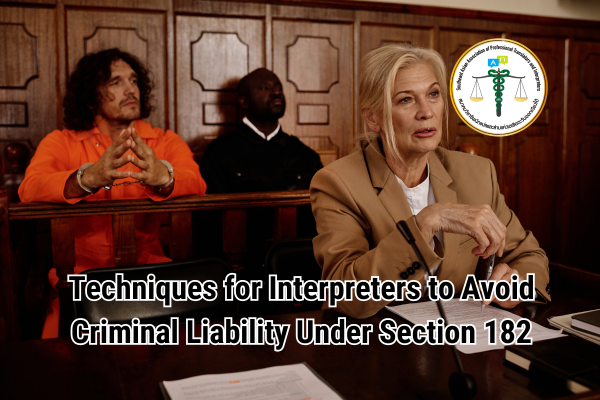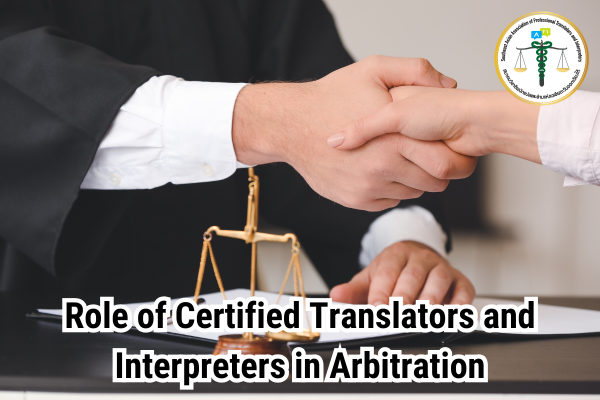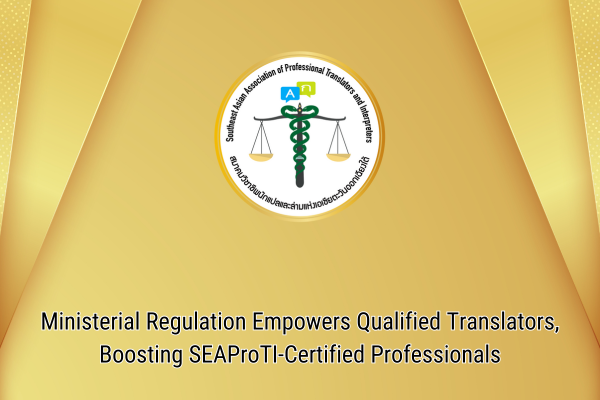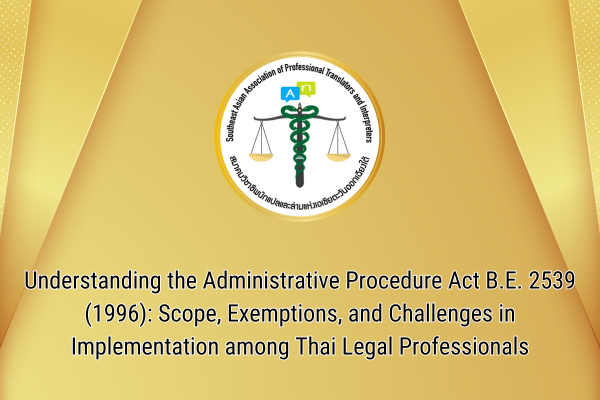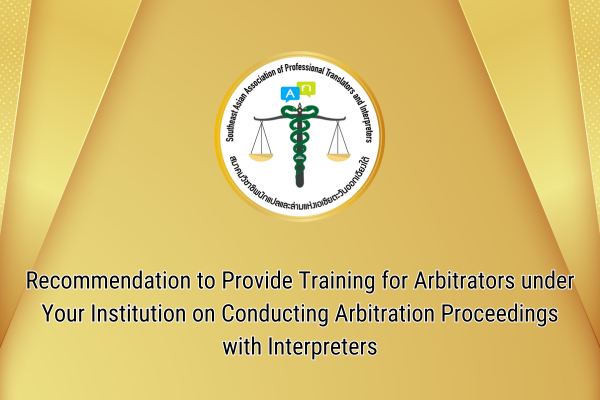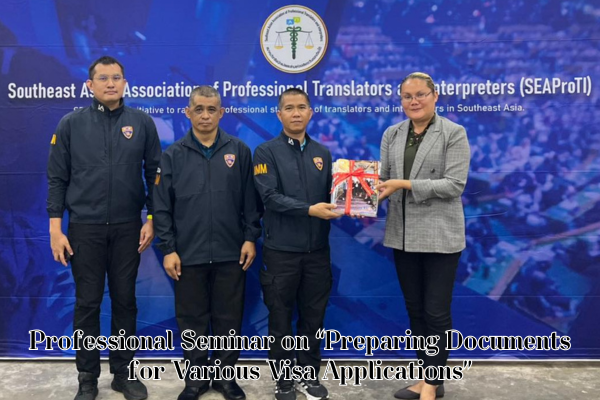Techniques for Interpreters to Avoid Criminal Liability Under Section 182
18 February 2025, Bangkok – In the justice system, accurate and comprehensible communication is crucial, particularly for defendants who do not understand Thai or have limited proficiency. The role of an interpreter is vital in ensuring a fair trial process. However, mistranslation can have serious consequences, including misunderstandings of charges or incorrect decisions in legal defense.
Section 182 of the Criminal Code
Section 182 states: “Anyone who commits an offense under Section 177 or Section 178, then repents and truthfully informs the court or the officer before the testimony or translation is concluded, shall not be punished.” This means that if an interpreter makes an error, it can be corrected during the proceedings, and the interpreter will not face criminal liability. This provision highlights the importance of ensuring accurate information is conveyed to the court and directly relates to the role of interpreters in delivering precise translations.
Case Example: Court Revising Due to Mistranslation
A significant case demonstrating the necessity of qualified interpreters is Supreme Court Judgment No. 1187/2539, where the court ruled that even if a defendant is Thai, if they lack sufficient understanding of the Thai language and are without an interpreter, the trial may be considered unlawful. This case underscores the judiciary’s commitment to ensuring defendants comprehend the charges and legal procedures fully.
Consequences of Mistranslation
-
Violation of Defendant’s Rights: If an interpreter misinterprets information, the defendant may not fully understand the charges or their rights, such as the right to an attorney or the right to remain silent, ultimately hindering their ability to mount an effective defense.
-
Unfair Judicial Proceedings: Misinterpretation may lead to an unjust verdict based on incorrect or misleading information, potentially impacting the defendant’s life and liberty.
-
Erosion of Trust in the Judiciary: Frequent instances of mistranslation could diminish public confidence in the fairness of the judicial system.
Measures to Prevent Legal Action Against Interpreters
-
Adherence to the Code of Ethics for Court Interpreters: Interpreters must uphold integrity and accuracy, refraining from altering content or inserting personal opinions.
-
Ensuring the Defendant’s Understanding: Interpreters should confirm that defendants fully comprehend translations before proceeding.
-
Training and Certification Standards: Relevant authorities should implement training programs and assessments to ensure interpreters possess sufficient legal knowledge.
-
Recording Court Interpretations: Whenever possible, audio or video recordings should be made of interpretations to serve as evidence in case of disputes.
-
Consulting Legal Experts: If interpreters encounter ambiguous legal terms or situations, they should seek guidance from legal professionals.
Conclusion
Mistranslation in the judicial process can significantly impact defendants and the overall fairness of the justice system. Therefore, having highly qualified interpreters with legal expertise is essential. Establishing performance standards, training programs, and preventive measures can help maintain fairness in court proceedings while reducing the risk of interpreters facing legal consequences for their work.
SEAProTI’s certified translators, translation certification providers, and certified interpreters:
The Southeast Asian Association of Professional Translators and Interpreters (SEAProTI) has officially announced the criteria and qualifications for individuals to register as “Certified Translators,” “Translation Certification Providers,” and “Certified Interpreters” under the association’s regulations. These guidelines are detailed in Sections 9 and 10 of the Royal Thai Government Gazette, issued by the Secretariat of the Cabinet under the Office of the Prime Minister of the Kingdom of Thailand, dated July 25, 2024, Volume 141, Part 66 Ng, Page 100.
To read the full publication, visit: the Royal Thai Government Gazette
เทคนิคที่ล่ามแปลผิดไม่ต้องรับโทษทางอาญา มาตรา 182
18 กุมภาพันธ์ 2568, กรุงเทพมหานคร – ในกระบวนการยุติธรรม การสื่อสารที่ถูกต้องและเข้าใจได้เป็นสิ่งสำคัญ โดยเฉพาะอย่างยิ่งสำหรับผู้ต้องหาหรือจำเลยที่ไม่เข้าใจภาษาไทย หรือมีความสามารถจำกัดในการสื่อสารภาษาไทย บทบาทของล่ามจึงเป็นปัจจัยสำคัญที่ช่วยให้กระบวนการพิจารณาคดีเป็นธรรม อย่างไรก็ตาม การแปลผิดอาจนำไปสู่ผลกระทบร้ายแรง ไม่ว่าจะเป็นการทำให้จำเลยไม่เข้าใจข้อกล่าวหา หรือทำให้การตัดสินใจต่อสู้คดีเป็นไปอย่างไม่ถูกต้อง
มาตรา 182 แห่งประมวลกฎหมายอาญา
มาตรา 182 ระบุว่า “ผู้ใดกระทำความผิดตามมาตรา 177 หรือมาตรา 178 แล้วสำนึกผิด และกลับแจ้งความจริงต่อศาลหรือเจ้าพนักงานก่อนจบคำเบิกความหรือการแปล ผู้นั้นไม่ต้องรับโทษ” หมายความว่า หากมีการแปลผิด ให้แก้ไขในช่วงพิจารณาคดี (Proceedings) ล่ามที่แปลผิดจะไม่ต้องรับโทษ ข้อความนี้สะท้อนให้เห็นถึงความสำคัญของการแจ้งข้อเท็จจริงที่ถูกต้องต่อศาล ซึ่งเกี่ยวข้องโดยตรงกับบทบาทของล่ามในการถ่ายทอดข้อมูลอย่างแม่นยำ
ตัวอย่างกรณีที่ศาลต้องแก้ไขเนื่องจากการแปลผิด
หนึ่งในคดีสำคัญที่แสดงให้เห็นถึงความจำเป็นของการมีล่ามที่มีคุณภาพ คือ คำพิพากษาศาลฎีกาที่ 1187/2539 ซึ่งศาลได้พิจารณาว่า แม้จำเลยจะเป็นคนไทย แต่หากจำเลยไม่สามารถเข้าใจภาษาไทยได้เพียงพอ และไม่มีล่ามช่วยแปล ก็อาจถือได้ว่ากระบวนการพิจารณาไม่ชอบด้วยกฎหมาย กรณีนี้แสดงให้เห็นว่าศาลต้องให้ความสำคัญกับสิทธิของจำเลยในการเข้าใจข้อกล่าวหาและกระบวนการทางกฎหมายอย่างถูกต้อง
ผลกระทบจากการแปลผิด
-
ความเสียหายต่อสิทธิของจำเลย: หากล่ามแปลผิด อาจทำให้จำเลยไม่เข้าใจข้อกล่าวหาหรือสิทธิของตน เช่น สิทธิในการมีทนายความหรือสิทธิในการปฏิเสธให้การ ส่งผลให้เขาไม่สามารถต่อสู้คดีได้อย่างมีประสิทธิภาพ
-
ความไม่เป็นธรรมในกระบวนการยุติธรรม: การแปลผิดอาจทำให้ศาลตัดสินคดีโดยอาศัยข้อมูลที่คลาดเคลื่อน ซึ่งอาจส่งผลกระทบต่อชีวิตและเสรีภาพของจำเลย
-
ผลกระทบต่อความน่าเชื่อถือของกระบวนการศาล: หากมีกรณีการแปลผิดบ่อยครั้ง อาจทำให้ประชาชนขาดความเชื่อมั่นในความยุติธรรมของระบบศาล
ข้อปฏิบัติเพื่อป้องกันล่ามถูกฟ้องกลับหรือถูกดำเนินคดี
-
ปฏิบัติตามจรรยาบรรณของล่ามศาล: ล่ามควรปฏิบัติงานโดยยึดหลักความซื่อสัตย์และความถูกต้องของการแปล ไม่ปรับเปลี่ยนข้อความหรือใส่ความคิดเห็นส่วนตัว
-
ยืนยันความเข้าใจของจำเลย: ล่ามควรตรวจสอบให้แน่ใจว่าจำเลยเข้าใจคำแปลอย่างถูกต้องก่อนดำเนินกระบวนการต่อไป
-
มีการฝึกอบรมและการรับรองมาตรฐาน: หน่วยงานที่เกี่ยวข้องควรมีระบบอบรมและประเมินล่ามให้มีความรู้ด้านกฎหมายเพียงพอ
-
การบันทึกการแปลในศาล: หากเป็นไปได้ ควรมีการบันทึกเสียงหรือวิดีโอระหว่างการแปลเพื่อเป็นหลักฐานหากมีข้อโต้แย้งภายหลัง
-
ขอคำแนะนำจากที่ปรึกษากฎหมาย: หากล่ามพบว่ามีความคลุมเครือหรือความเสี่ยงในการแปลผิด ควรขอคำปรึกษาจากผู้เชี่ยวชาญด้านกฎหมาย
สรุป
การแปลผิดในกระบวนการยุติธรรมอาจส่งผลกระทบอย่างมีนัยสำคัญต่อตัวจำเลยและต่อความยุติธรรมโดยรวม ดังนั้น การมีล่ามที่มีคุณภาพสูงและมีความรู้ด้านกฎหมายจึงเป็นสิ่งจำเป็นอย่างยิ่ง นอกจากนี้ การกำหนดมาตรฐานการปฏิบัติงานของล่าม การฝึกอบรม และมาตรการป้องกันข้อผิดพลาด เป็นแนวทางสำคัญในการรักษาความเป็นธรรมในกระบวนการศาล พร้อมทั้งช่วยลดความเสี่ยงที่ล่ามอาจถูกฟ้องกลับหรือถูกดำเนินคดีจากการปฏิบัติหน้าที่
เกี่ยวกับนักแปลรับรอง ผู้รับรองการแปล และล่ามรับรองของสมาคมวิชาชีพนักแปลและล่ามแห่งเอเชียตะวันออกเฉียงใต้
สมาคมวิชาชีพนักแปลและล่ามแห่งเอเชียตะวันออกเฉียงใต้ (SEAProTI) ได้ประกาศหลักเกณฑ์และคุณสมบัติผู้ที่ขึ้นทะเบียนเป็น “นักแปลรับรอง (Certified Translators) และผู้รับรองการแปล (Translation Certification Providers) และล่ามรับรอง (Certified Interpreters)” ของสมาคม หมวดที่ 9 และหมวดที่ 10 ในราชกิจจานุเบกษา ของสำนักเลขาธิการคณะรัฐมนตรี ในสำนักนายกรัฐมนตรี แห่งราชอาณาจักรไทย ลงวันที่ 25 ก.ค. 2567 เล่มที่ 141 ตอนที่ 66 ง หน้า 100 อ่านฉบับเต็มได้ที่: นักแปลรับรอง ผู้รับรองการแปล และล่ามรับรอง


